Pug: Complete Dog Breed Profile
Comical, Adaptable, Easy Going
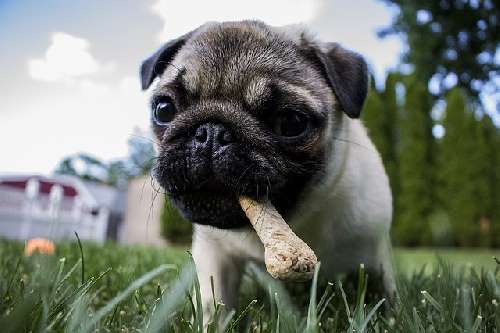
By Janice Jones |Last Updated 02-27-2021
Thinking
you might be interested in a Pug? Well, if you find humorous, adorable, and
loving all good qualities, then they might be the absolute perfect dog for
you and your family.
Everyone knows the cute and adorable Pug for their short,
flat face, bulgy eyes, and their infamous face wrinkles.
The curly-Q tail gives
away the toy dog classification and the perfect curly Pig tail is said to have
two full curls/spirals.
Some say the have a very comical look, almost like a
cartoon character. This look is not for everyone, but if you find it absolutely
adorable, then you might want to look into purchasing a pug.
Pugs
are one of the most popular dogs in America, and it is easy to see why. One
unique quality about these little guys is that they will essentially adapt to
any lifestyle that you have.
If you have a very laid back lifestyle and like to
sit on the couch, watch movies, and eat snacks, then your pug with sit there
right with you.
On the other hand, if you are very active and love to go
biking, or surf, then bring him with you, and they will adapt to that
lifestyle.
The Pug is often described as Multim
in Parvo, which means “ a lot of dog in a little space.” That could not be
truer when it comes to these dogs. They are the most energetic, happy, little
bundles of joy in a little toy dog package.
Quick Facts
Other Names Used: Chinese Pug, Dutch bulldog, Dutch
mastiff, Mini mastiff, Mops, Carlin
Affiliation: Toy group; AKC recognized in 1885
Size
Height: Males: 12 – 14 inches
Females: 10 – 12 inches
Weight: Males: 13 – 20 lbs
Females: 13- 18 lbs
Coat Type: smooth, short hair coat
Colors: usually black, fawn, apricot
fawn, and silver fawn with a black mask
Country of Origin: China
Activity Level: low to moderate
Life Expectancy: 12 to 15 years
Good with Children: Pugs are notorious for being
excellent with children
Good with Other Pets: yes
History
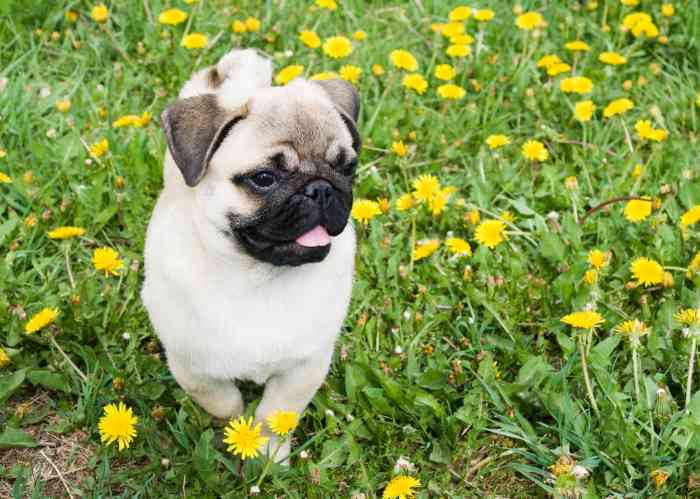
Pugs
are actually one of the oldest known breeds, and are said to have originated
before 400 BC and continue to flourish to this day. There are many theories
about where the Pug originated and what they are descendants from.
Some
researchers say they are descendants from the Pekinese, others think that they
came from Bulldogs, but most people can agree that they originated in Asia,
more specifically, China. However, the breed became popular during the
Victorian times in the 19th century.
They were actually bred to have some
extra skin on their face, which results in their face wrinkles that many people
know and love.
Centuries ago in China, these wrinkles were bred to create a
pattern on their forehead. This pattern supposedly looks like the Chinese
character for “ Prince.”
These furry
friends were actually companions to Buddhist monasteries in Tibet, and then the
breed started appearing in Europe and Japan. The AKC recognized the breed in
1885, and ever since, they have been one of the most popular AKC breeds.
Personality/Temperament
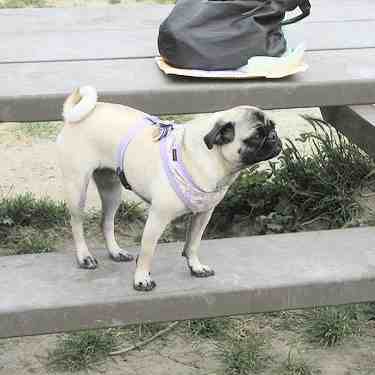
The Pug
is an energetic and overall easygoing and very happy dog. If you want to be entertained
for hours, but also have a pup that will sit there with you on the couch, the
Pug is perfect.
| Traits | Rating |
|---|---|
| Playfulness | |
| Affection Level | |
| Friendliness Towards Strangers | |
| Good with Children | |
| Good with Other Dogs | |
| Good for First Time Owners | |
| Exercise Needed | |
| Ease of Training | |
| Watch Dog Ability | |
| Grooming Requirements | |
| Shedding | |
| Cold Tolerant | |
| Heat Tolerant |
Dog Breed Ratings Got You a Little Confused?
Here’s a little help in understanding them
- Playfulness: Most Playful = 5 Least Playful = 1
- Affection: Most Affectionate = 5 Least Affectionate = 1
- Friendliness Towards Strangers: Most Friendly = 5 Least = 1
- Good With Children: Great= 5 Not Good with Children = 1
- Good With Dogs: Great = 5 Not Good Around Dogs = 1
- Good With First Time Owners: Fine=5 Not Appropriate = 1
- Exercise Required: Extensive Daily Exercise = 1 Minimal = 1
- Ease of Training: Very Easy = 5 Difficult = 1
- Watch Dog: Excellent Watch Dog = 5 Minimal = 1
- Grooming: Time Consuming = 5 Minimal = 1
- Shedding: Heavy Shedder = 5 Minimal = 1
- Cold Tolerance: Well Tolerated = 5 Poor Tolerance = 1
- Heat Tolerance: Well Tolerated = 5 Poor Tolerance = 1
This little bundle of joy has such a comical look to it, almost
cartoonish, and a personality to match. Happy-go-lucky and is
very loving, they are loyal, and affectionate with their whole family.
These dogs are the
near perfect family dog. They can adapt to most location and situation and get
along with all ages, especially kids that can give them extra nonstop
attention.
Since the pug is so energetic and
happy all the time, they tend to overwork themselves to keep their owners
happy.
They will play as long as their family does, but keep in mind that dogs
overheat much quicker than humans, and especially pugs because they are
brachycephalic.
This just means they have a short muzzle, which causes them to
have a harder time catching their breath. Look out for this when playing
outside with your little guy.
Pugs are very easy to hang out with
and they will love anything that you do. This is a characteristic that many
people are attracted to. They are also just easy companions and fun to be
around, however make sure that they know who is in charge and who is the real
alpha dog.
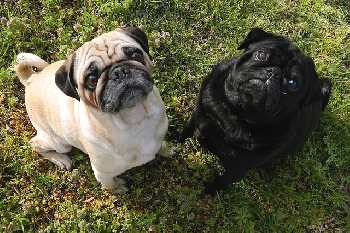
The owner needs to be calm, confident, and consistent with rules.
When these dogs feel like they have the control they will start guarding things as their
own such as furniture, toys, or other places or spots in the house. This only
happens when they are allowed to take over, so be careful of that.
These dogs have a
tendency to be very sensitive to the tone of people’s voices, so harsh
punishment is unnecessary.
They are good watchdogs, however not yappy, which is
a good quality to have in a toy breed.
Grooming
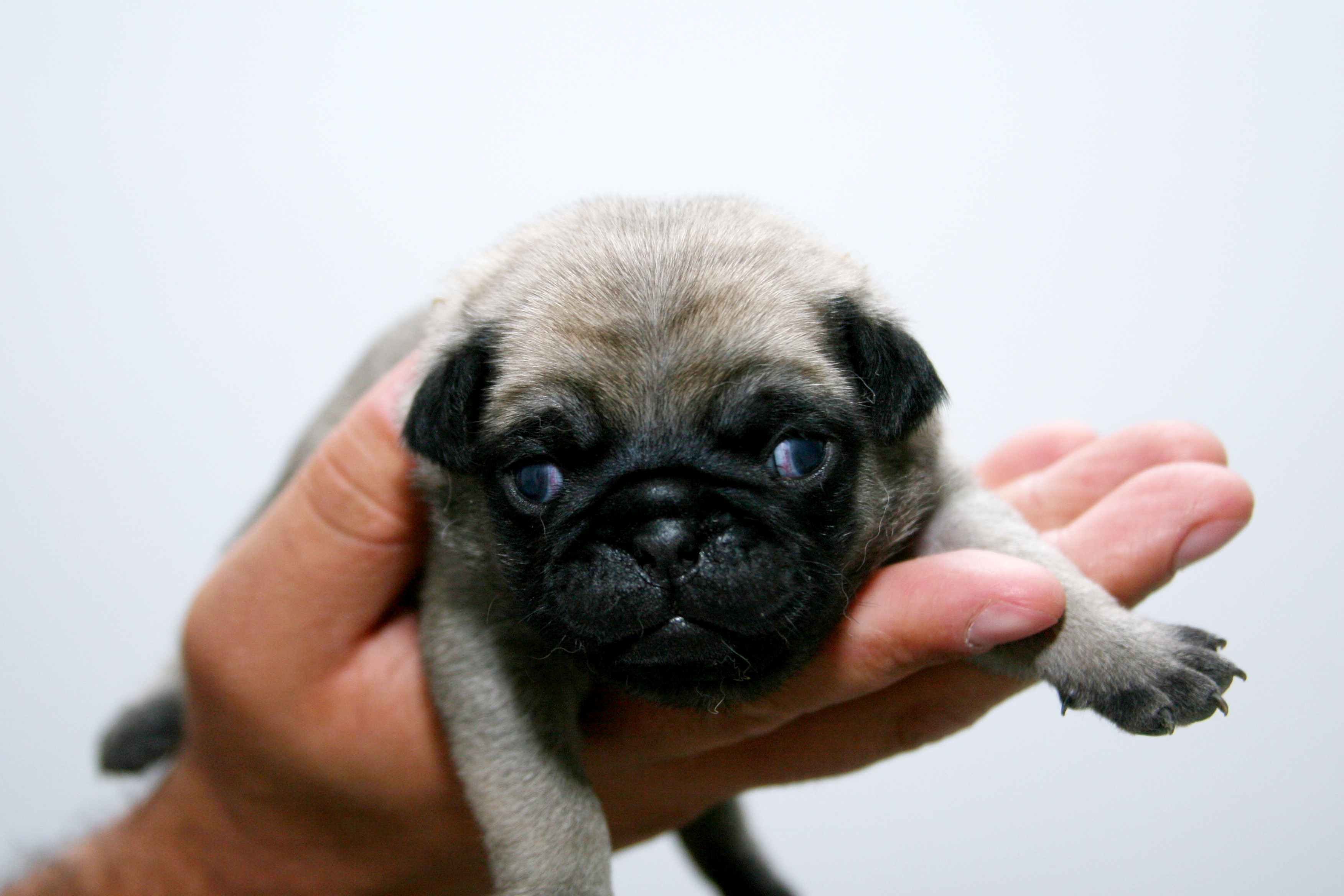
Since
Pugs have a short and smooth coat, they are very easy to groom. This breed is a
pretty heavy seasonal shedder, so they need to be brushed often with a firm
bristle brush.
A good shampooing/ bath when necessary, but make sure to dry
them well so they do not become chilled. The body grooming is a piece of cake,
however the wrinkles and creases on their face need to wiped out and cleaned
daily.
If not, then moisture gets in them and bacteria can grow which is a bad
thing overall, but especially so close to their eyes, nose, and mouth.
Airtight
wrinkles equal airtight infections, but as long as the Pug is kept clean and
bathed, they are pretty healthy.
Other than that, there is little else in the way of grooming that is required. All dogs, however, even short haired breeds need the nails clipped, the teeth brushed, their anal glands expressed periodically and their ears checked and cleaned periodically.
Health Concerns of the Pug Breed

This breed is fairly healthy, but there are a few precautions you might want to take
if you decide to bring this furry friend into your family.
They are
brachycephalic which means they have a flat face and short muzzle, which leads
to an elongated palate and causes respiratory problems. They especially have
trouble breathing in warmer weather and it can even require surgery if it gets
too bad.
Keep this is mind if you’re playing with your pet outside. They always
need to be supervised when playing.
Read more about Brachycephalic Syndrome
Proptosis
This is
a condition where the dog’s eye essentially pops out. This can be caused by
putting too much pressure on their neck such as pulling too hard at a choke
collar, or by even having it on too tight.
Pug Dog
Encephalitis (PDE)
PDE is
an inflammation of the brain that usually occurs in Pugs 2-3 years of age. The cause is
unknown.
Obesity
Pugs are especially prone to obesity and an overweight pug is not a healthy one.
Cherry Eye
Cherry Eye occurs in a variety of breeds and is not a pretty sight. The third eyelid contains the glands that produce tears. When the gland pops out of position, it is visible and become swollen and even infected.
Hip Dysplasia
You might think that hip dysplasia is restricted to only large breed dogs, but that is not so. Many small breed dogs are also prone to the disorder.
If you still need answers to your questions about the Pug breed, may I suggest you check out how to take care of a Pug.
Pros
- Pretty
adaptable to your lifestyle - Notorious
for being great with kids - Loyal,
loving, and outgoing - House training
is a walk in the park with food and positive reinforcement. - Easy to
hang with
Cons
- Can be a
heavy shedder - Tends to
overeat which can lead to obesity - Does not
do well in the heat - Respiratory
problems - Demands
daily cleaning of face
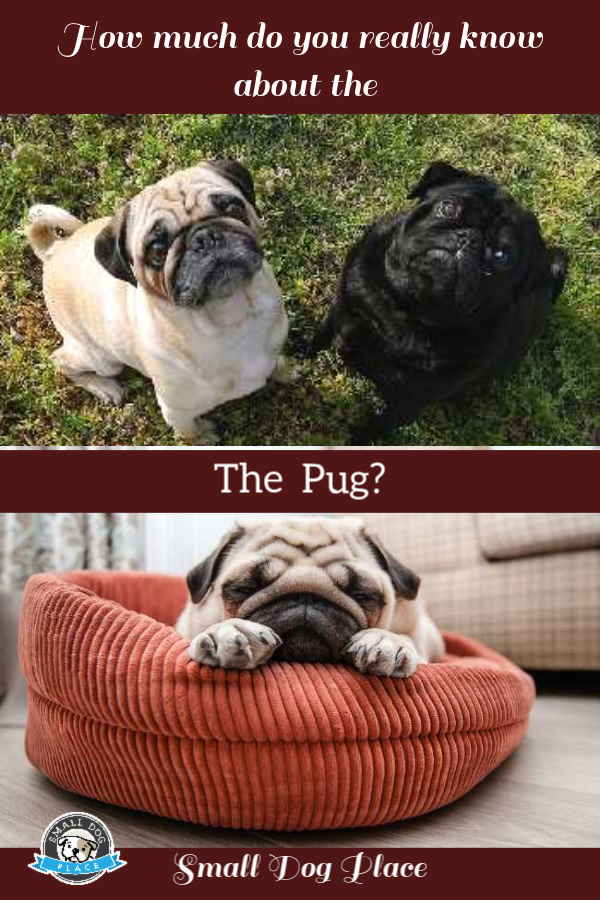
Your Pug’s Story
Do you have a pug or have had one in the past? Care to share your experience about living with a pug?
Does This Article Deserve Your Thumbs Up?
We always appreciate your support and encouragement. Your thumbs up means so much to us. Please like this article.

Free Monthly Newsletter
Sign Up for Our Free Newsletter and get our Free Gift to You.
my E-book, The Top 10 Mistakes People Make When Choosing a Dog (and how to avoid them)
If you enjoyed this page, I’d love it if you’d let me know. Just click the button below. Thank you.
Sharing is Caring


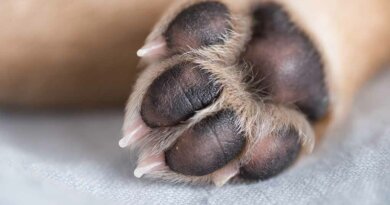

cialis going over the counter: do you need prescription for cialis cialis international